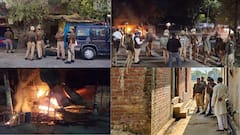The Polish Writer Who Killed A Man And Recreated The Crime In A Bestselling Novel
Krystian Bala was sentenced to 25 years in prison after he was found guilty of orchestrating the murder of a man he suspected of having an affair with his ex-wife.

Writers can draw inspiration from anywhere to create a piece of art. More often than not, it is from their personal lives. In 2000, Polish author Krystian Bala took this a step further when he masterminded a grisly abduction and murder that he used as a plotline in a bestseller, ‘Amok’, he published three years later.
The victim of the murder was identified as Dariusz Janiszewski, an advertising company director whom Bala suspected of having an affair with his ex-wife.
In a country described as one of Europe’s safest, with a low crime rate, the crime and the ensuing trial kept the public hooked for years.
In 2007, Bala was sentenced to 25 years in prison for planning and directing the murder of Janiszewski, reported NBC News.
The Murder
On a December morning in 2000, anglers discovered the body of a 35-year-old man along the Oder river in the Polish city of Wroclaw. The corpse bore livid bruises from repeated beatings and a series of knife wounds, reported the Observer. The man was identified as Janiszewski, who had been reported missing over a month before.
The body was discovered with a cord binding Janiszewski’s hands behind his back that was also looped around his neck, a Time Magazine report noted. The body was coiled in a manner that a slight wiggle would tighten the noose.
During the investigation, police pathologists found that Janiszewski had been denied food and water for three days before his death. However, the case file was shelved within six months as officers failed to find a single lead.
In 2003, however, the folder marked ‘Janiszewski’ was taken out by Jacek Wroblewski, a 38-year-old detective in the Wroclaw police department, whose unit had been assigned the case for a fresh look. Wroblewski started going through the case, and, after intensely poring over the documents, ended up finding a lead. The police officer realised that Janiszewski’s mobile phone, on which he received two calls on the day he disappeared, had never been recovered, according to a New Yorker report. And thus began an effort to track it down.
Soon the police discovered that the mobile phone had been sold on an internet auction site to an unsuspecting businessman three days after Janiszewski’s disappearance.
The phone was sold by someone with the username ‘ChrisB7’, and a cursory police search revealed that the account was registered to Krystian Bala, reported Observer.
ALSO READ: Cop-Turned-Serial-Killer: Story Of Umesh Reddy, Who Terrorised Karnataka & Beyond
Jilted Lover Or Psychopath Writer?
Bala married his high school sweetheart, Stanislawa, or Stasia as he called her, but their three-year marriage was marred with physical violence, to the extent that the Polish police placed the family on a domestic violence register, the Observer reported.
In 1999, when the couple separated, Bala became obsessed with tracking his wife’s new life. He hired a private detective, and shortly came to know that she was seeing Dariusz Janiszewski.
‘Amok’
As police started to investigate Bala, they came across his weblog, which contained a series of personal ramblings described as demented in some accounts. These were later published as a book, ‘Amok’.
Carrying a surreal image of a goat — an ancient symbol of the Devil — on its cover, the book was described as sadistic, pornographic, and creepy by the New Yorker.
A bored Polish intellectual, Chris, is the main character who narrates the story, which is a derivative of many postmodern novels. When not musing about philosophy, he is drinking and having sex with women. In a file found by the police during the investigation, which could be accessed with the password ‘amok’, Bala had catalogued his sexual encounters with over 70 women.
“Chris, the protagonist of ‘Amok’, is a monster of postmodernity. In his view, not only is there no sacred being (‘God, if you only existed, you’d see how sperm looks on blood’); there is also no truth (‘Truth is being displaced by narrative’),” the New Yorker article stated.
One character admits that he doesn’t know which of his constructed personalities is real, and Chris says, “I’m a good liar because I believe in the lies myself.”
In the story, Bala has set Chris free of any sense of truth — moral, scientific, historical, biographical, legal. Quick reminder, Chris was also the name of Bala’s username on the internet auction site. The protagonist embarks on a grisly rampage in the novel. After his wife catches him having sex with her best friend, she leaves him.
Further, into the novel, Chris rejects what is considered the ultimate moral truth and kills his girlfriend Mary. Wroblewski, who had delved deep into the novel to find more clues, was struck by a line: “I tightened the noose around her neck, holding her down with one hand.” Many other striking similarities were noted as well between the murder in the book and Janiszewski’s killing.
The novel was completed by Bala in 2003 and, by the time Wroblewski got hold of it, the author was moving between different parts of the world, including Asia and Micronesia. The police officer had to tread with caution to get hold of him because if Bala had got a whiff about the probe, it would have been impossible for the Polish authorities to arrest him on foreign soil.
ALSO READ: ‘Gangster’, Starlet, Deadly ‘Honeytrap’ – Inside 2012 Murders Of Aspiring Producer & Delhi Bizman
Arrest And Trial
Bala visited Poland in 2005 and was arrested, and later produced in court, reported the Guardian. While the prosecution argued pinning him for the murder, Bala maintained his innocence and complained that his novel was being misinterpreted.
Bala also insisted that the details for ‘Amok’ were derived from media reports of the Janiszewski murder. On Mary’s murder in the novel, he said that it was simply a symbol of the “destruction of philosophy”.
The police established that Bala knew the dead man, and called him around the time of his disappearance, and had then sold his mobile phone on the internet, according to the Guardian report.
As Bala was sentenced to 25 years in jail, the judge admitted that Bala could not be found directly guilty of carrying out the murder. But the evidence sufficed to find him guilty of planning and orchestrating the crime, the judge noted.
While the link between the murder and the novel’s content remained foggy, one stark difference between the two worlds was: Chris escaped unpunished while Bala could not.






































